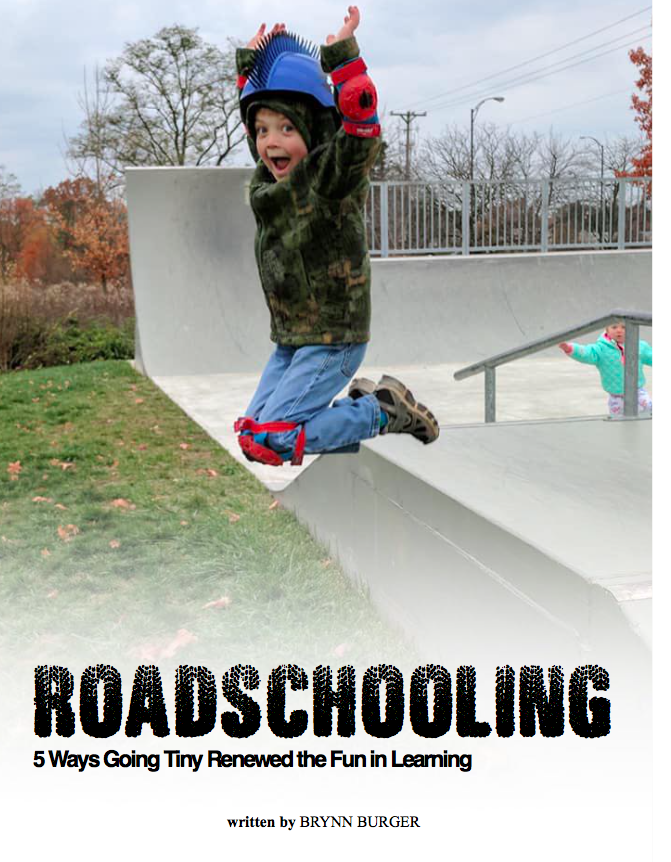Have you found yourself binge-watching HGTV and dreaming of a tiny house on wheels that can take you anywhere? If you are like me, then you can find yourself elbow-deep in ice cream and Pinterest on a Saturday night creating a dream that, deep down, you don’t believe can happen for you.
For my family, the dream became reality.
After a year of researching tiny homes and the affects simplified living could have on our son’s behavior and sensory diagnosis, we were convinced that this was a necessary change for our family. We sold our home, 15 acres, and over 80% of our belongings and hit the road with the freedom to ‘Roadschool’ our kiddos. This traveling version of homeschooling has truly put the fun back into learning for our children as well as for many others living a road-worthy lifestyle.
Making the switch to Roadschooling from public school can take some preparation so, if you’re on the fence, here are
5 Ways Going Tiny Renewed the Fun in Learning:
Affording to Roadschool
Prior to downsizing, we lived in a 2200 square foot house whose mortgage required both my husband and I to work jobs outside the home, put our oldest son in public school and pay for our newborn daughter to be in daycare. After going tiny, our reduced living expenses and mortgage have afforded for us to be a one car, one income family; neither of which did we ever think possible.
Making these changes allows us to transform from corporate robots by day back into the fun-loving parents we have always been. It allows us to spend infinitely more time with our children doing both educational activities as well as taking fun adventures we’d never thought of before.
So now, instead of dreading the morning prep for public school, our kids get up when they wake up (which is still before the sun), enjoy breakfast, relax as they get ready for their day, and start things off with a trip to the rec center, rock climbing, or yoga to get their juices flowing before jumping into reading and writing. This helps our energetic toddler and our son who has several mental health diagnosis get excited about learning.
Hands-On Learning

All students learn in a variety of ways. Whether auditory, visual, or kinestetic learners, all children can benefit from lessons that are relevant to their real life experiences. This kind of learning transcends the basic science experiment or dissection lab. While our son has participated in both and loved them, Roadschooling also allows for real-world lessons in real-time, unlike those provided in the traditional classroom setting.
When grocery shopping, our son reads the list, counts the produce items, and keeps track of the financials from totals to coupons. This becomes both a math and a budgeting lesson. Before going tiny, we wouldn’t have had opportunities like that, or like the one when we baked cookies for the servicemen and women in our local community and delivered them. This project taught our son about serving others, about community volunteers, and he ended up getting a tour of the local firehouse, firetruck, and even got to put on all of the fire gear and turn on the sirens; a six year old’s dream!
Re-Vamping Old School Subjects

No matter how you slice it, education will always involve basic core skills and principals like math, reading, and writing. No child enjoys all of these subjects equally, but living tiny and Roadschooling has afforded us the ability to enhance the lesser loved subjects.
For our son, his behavior challenges are no match for his academic prowess. He reads at least two grades ahead of his peers, however, he will swear to you that he hates to read. To make this subject fun for him, we allow him to choose what he reads from a book list at his reading level. He reads books aligned with units of study that he enjoys, such as aviation or rock climbing. We also read outside often or take his books on a bike ride to the park. This added incentive reduces his anxiety about having to complete tasks he doesn’t necessarily enjoy.
Living tiny and Roadschooling has freed us from the endless parent meetings about why our son worked ahead and ended up in trouble out of boredom and now he is able to flourish, even in core skills that aren’t his first preference.
Focus On Strengths and Allow For Weakness

While our son, and many students, has subject areas where he excels, there are also areas where he really struggles. For instance, he is well above grade level in math and really enjoys the critical thinking involved in problem solving. However, his inattentiveness causes him great frustration when it comes to writing because he feels it takes too long so he is likely to give up and possibly meltdown.
Roadschooling and living tiny has gifted us the time to take as long as he needs for tasks with which he struggles and even allow for breaks to get up and move, run outside and play, or take an incentive trip once he completes a difficult task.
This allowance for additional time has encouraged his motivation to complete these tasks as well as decreasing his anxiety about tackling them because he knows if he needs a break, he can take one.
Opportunities to Experience Culture

Instead of the traditional way of telling our kids to “be kind” or “be generous,” we are able to both mode this behavior for our kids as well as involve them in excising these crucial skills. Decreasing our ‘stuff’ by over 80% allowed our children to understand and experience the joy that comes from giving things away to others who need them.
Our travels are allowing us incredibly unique opportunities to serve and connect with folks from other cultures, ethnicity, socioeconomic and religious backgrounds that we might never have been able to meet had we stayed in our traditional way of living.
Our kids get to dance and sing songs, eat food and wear clothing from a variety of cultures and people groups right here in our own country. It is pretty incredible and going tiny was our bridge to these experiences.
If you are considering downsizing or Roadschooling your children, check out my eCourse “Timeline to Tiny” including all the resources you’ll need to get budgeted, researched, and downsized in one year.

